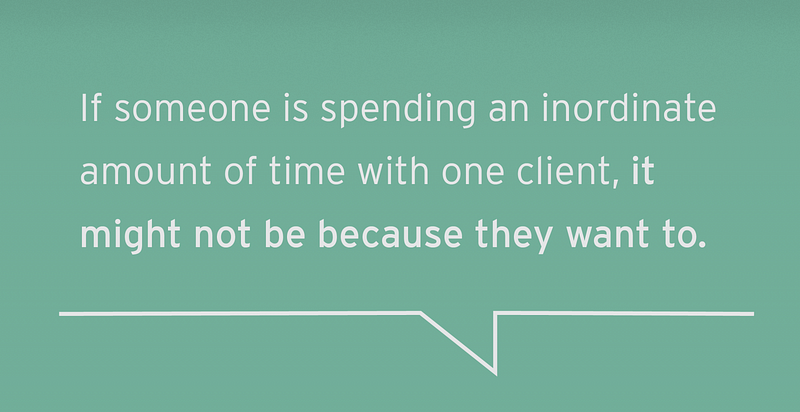Tenure, Not Time, Predicts Client Loyalty

When agent Jerry Maguire learns he’s getting the boot from his sports management company, his SMI swan song is a final appeal for everyone (anyone) to join him as he leaves. “…This moment will be the moment of something real and fun and inspiring in this God-forsaken business… Who’s coming with me?”
The answer, he learns, was practically no one. Despite landing lucrative endorsements and signing top talent, he keeps only a bombastic NFL client, one idealistic co-worker, and an office goldfish. (And the fish didn’t have much of a choice.)

That’s no surprise, according to McCombs Associate Professor Sekou Bermiss, who looked at why clients are more likely stay loyal to firms instead of following their agency contacts out the door.
“A lot of people will tell you, ‘If I go, my clients are coming. I’m the show. They’re here for me,’” says Bermiss. “But what I can tell you is they don’t take as many clients as they might think.”
Part of the reason for that, write Bermiss and Cal Poly co-author Bruce Greenbaum in Administrative Science Quarterly, is because clients often feel they have too much to lose by severing ties with a firm that’s served them well, even if they have a decent relationship with their departing account manager. And that’s not by accident: Companies build teams and systematize knowledge so that anyone can step in and offer the same value. They may also specify what information a departing employee can (and cannot) take with them if they leave.
And generally, it works. Research shows that ties are stronger at the firm level than the individual level. But there’s a missing piece to this, say Bermiss and Greenbaum. While clients are more likely to stay with the firm, the occasional Rod Tidwells of the world pack up and leave, too, and the researchers wanted to know why.
‘That Was a Surprise. We Expected the Opposite’
Bermiss and Greenbaum analyzed more than 1,000 lobbyists and lobbying firms in Texas between 2001–2009, as well as almost 6,000 of their clients. They looked for patterns and an answer to the question: Do lobbyists “own” their client relationships?
“They certainly think so,” quips Bermiss. Overall, however, they found that clients opted to stay with the firm representing them, even when the lobbyist they’d been working with left. That’s a result they expected. What surprised them was that the more time a lobbyist spent working on the client’s account, the more loyal the client was to the firm.
“Our premise was that the closer you are, the more attention you give, the more time you spend, the stronger the social relationship will be — and the more likely two people will be to continue to transact,” he says.
Instead, they uncovered a dynamic that stands in stark contrast to earlier research. When a manager dedicates the majority of his or her time to only one client, they don’t build an equitable working relationship. Instead of trust and loyalty, the relationship is characterized by a power imbalance: The client demands a lot of time from their manager, and if that manager leaves the firm, the client simply transfers that demand to the next assigned individual.
“That was a surprise. We expected the opposite,” says Bermiss. “If someone is spending an inordinate amount of time with one client, it might not be because they want to. There might be a ‘you need my business more than I need your expertise’ dynamic at play.” In short, billable hours don’t translate to loyalty.
Tenure, on the other hand, does. Managers who work with a client for many years, often while overseeing other accounts simultaneously, are most likely to take business with them, Bermiss and Greenbaum found. “What we show is the longer I have a relationship with you, the more likely you are to remain with me if I stay, and leave with me if I go,” Bermiss explains. At the same time, dividing attention among several clients may lead to more balanced partnerships.

‘It’s a Conundrum for Every Professional Services Firm’
For a firm looking to keep clients happy, that can be a double-edged sword. “If I’m the client, then the longer I work with you, the more I’m going to start to feel that the value is with you, not with the firm,” says Bermiss. “At the same time, companies want to build long-term relationships. It’s a conundrum for every professional services firm.”
To reduce the chance that top-performing employees will take clients with them, companies can form large account teams to ensure that others can (and do) pick up where someone else left off. They can institute mentorship programs to make sure skills and knowledge are shared among employees. They may also require those same employees to sign contracts that stipulate clearly what belongs to the company, from client phone numbers to strategy notes. These tactics enable a client to develop solid relationships without viewing any individual as indispensable.
Even so, the crux of a service provider relationship is one-on-one attention that grows and develops with time. In the end, that’s what saved Jerry Maguire and might be every account manager’s best asset.
Loyal to Whom? The Effect of Relational Embeddedness and Manager’s Mobility on Market Tie Dissolution was published in Administrative Science Quarterly.
Story by Adrienne Dawson
About this Post
Share:


